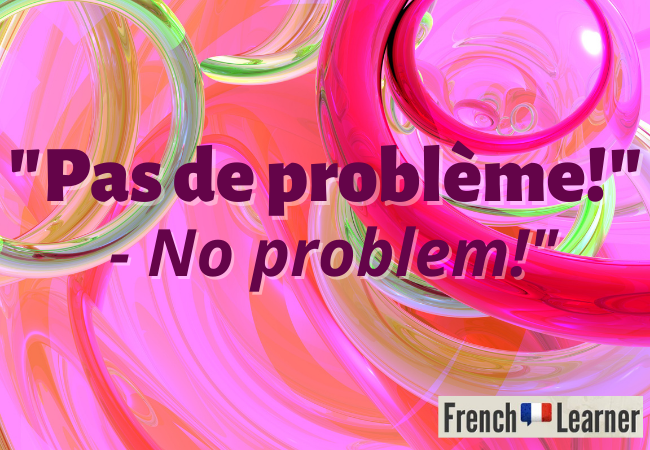The French expression for no problem is “pas de problème”. The common mistake is to say “non problème”, but this is wrong. The more formal way of saying “no problem” is: “Il n’y a pas de problème”. This translates literally to “there is no problem”. Keep reading to learn the seven most common ways to say “no problem” in French.
pas de problème
no problem

How to say “no problem in French”
In real spoken French, the de is glided over:
pas (de) problème
What does “pas de” mean?
In the expression, “pas de problème“, what “problème” means is very obvious! But, what does “pas de” mean? The word “pas“ translates to both “no” and “not”. When followed by a noun, the word “de” must be inserted to mean “not any”. Hence, the literal translation of “pas de problème” is “not any problem.

Other ways of saying no problem in French
There are many other ways to say no problem in French besides “pas de problème”. Let’s explore them now!
Firstly, we need to examine the verb “poser” as it’s associated with “pas de problème”. The verb “poser“ in this context means to “pose” or “cause” a problem. Hence, the expression, “Ça ne pose pas de problème” means “that doesn’t pose (or cause) any problem”.
1 – Pas de souci
The expression “pas de souci” translates to “no problem”, “no worries” and “no sweat”. The world “souci” translates to “worry”. A longer version of this expression is: “Il y a pas de souci”, which translates literally to “there is no worry”.
2 – Ce n’est pas grave
The French expression “ce n’est pas grave” translates literally to “it’s not grave/serious” and really means “it’s no big deal”. Other translations include “never mind” and “it doesn’t matter”. The French use the expression “ce n’est pas grave” very frequently and it can be used synonymously with “pas de problème”.
3 – Ça ne fait rien
Another useful expression is “ça ne fait rien“. This expression translates literally to “that makes nothing” and means “it’s nothing”, “that’s alright”, “that’s ok” and “don’t mention it”. The word “fait” comes from the verb faire, which means to make or do. The word “rien” means “nothing” or “anything”.
4 – Aucun problème
The word “aucun“ translates to “no” or “not any” and can proceed any noun. Hence “aucun problème” means “no problem” and “Je n’ai aucun problème” means “I have no problem”.
5 – Ne dérange pas
The verb “déranger“ means to bother or disturb. When making sentences “ne dérange pas“ means not to disturb, or “have no problem”. Thus, the example sentence, “Ça ne me dérange pas si tu veux sortir ce soir” translates to “I have no problem if you want to go out tonight”.
6 – Il n’y a pas de quoi
The French expression, “Il n’y pas de quoi“ is almost impossible to translate literally. The closest literal translation would be “There is no what”. However, this expression can be used to express both “you’re welcome” and “no problem”.
7 – Il n’y a pas de lézard
“Il n’y a pas de lézard” is a slang French expression that translates literally to “there is no lizard” and means “no problem”. This expression has its roots in music where the term “un lézard” (lizard) referred to a disturbance in the quality of the sound. The expression can be shorted to “Y’a pas de lézard”.

Conclusion
Congratulations! Now you know how to say “no problem” in French. Now check out our lessons covers 16 ways to say “please” and 7 ways to say “you’re welcome”.

